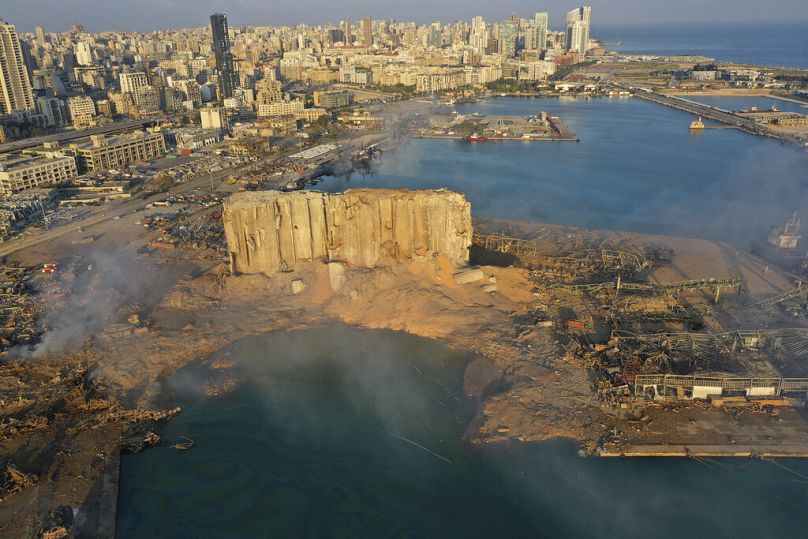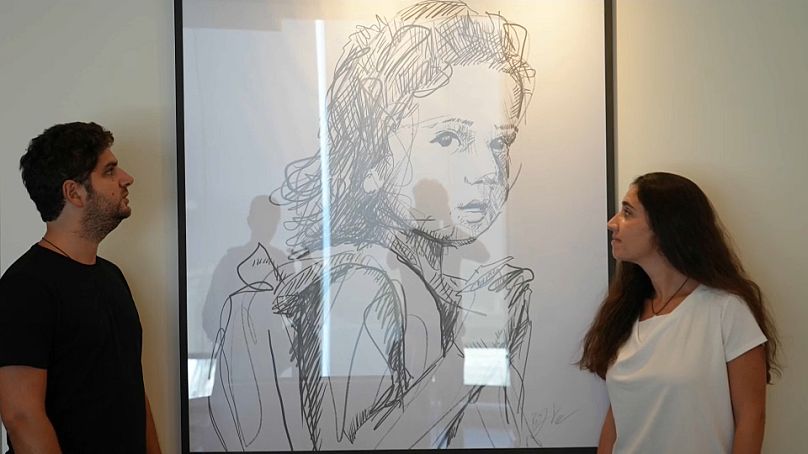A year after a massive explosion at the Beirut port killed 200, the victims’ grieving families are still waiting for answers, accountability and justice.
Little did Paul and Tracy Naggear know that their beautiful apartment overlooking the port of Beirut would bear witness to the death of their three-year-old daughter Alexandra, or "Lexou", as they like to call her.
The blast on August 4, 2020, killed more than 200 people, wounded 6,500 others and caused billions of dollars in damage.
Now, a year after the massive explosion, the couple has become the most prominent face of the victims' families bravely turning their grief into political action.
To them, the fight against the ruling class, whom they accuse of incompetence in dealing with the crisis, has just begun.
"We can't live in a country where these criminals are still in power, it was part of our thinking, we need truth, we need justice, we need accountability...but we also need to kick them out," Paul Naggear told Euronews. He recently led a landslide victory for the opposition in the syndicate of engineers elections last week.
But the wounds still run deep: the couple say they rarely visit their Beirut apartment due to the painful memories.
"This is the house of Alexandra, the memories are here, we see her running, we see her crying, we see...it's her house," Tracy Naggear told Euronews.
Finding refuge and strength
Paul and Tracy, like many other families of the victims, find refuge and strength in the support they felt -- and still feel -- from their fellow countrymen and women, and the younger generation who stepped in to help the families when the government failed them.
"On the night of the 4th of August, volunteers and NGOs started working, they started repairing the buildings, rebuilding Beirut. When I look back and see what they have done, I can't just let go and leave," Tracy said.
"We thought about leaving a lot of times but we didn't because the people here are working so hard to make this place a better place, this country a better country. I cannot leave them to work alone when I was the first victim of this explosion."
While some political parties are trying to distance themselves from a perceived ruling elite, claiming they too are seeking truth and justice, many ordinary people are sceptical of their intentions, believing they are only seeking to increase their popular base in the upcoming parliamentary elections.
Lebanon's crisis deepens
Around 300,000 people were initially left homeless after the explosion that left the Lebanese capital on its knees, and not everyone has been able to move or repair the damage on their properties.
Some have been living in empty, damaged buildings.
The Lebanese government has been relying heavily on NGOs, civil society and the private sector in its response. But so far, only around 50% of around 77,000 damaged buildings have been repaired.
It is estimated that thousands of people are still homeless in the city. And the worsening economic crisis makes it harder for some to find new accommodation.
Lebanon's newly appointed Prime Minister-designate, Najib Mikati, who was appointed at the end of July, has called for unity, but warned that he cannot achieve miracles saying the country is still in a “very difficult situation”.
But corruption in the nation, which was struggling financially and politically before the blast, means humanitarian agencies had to step in to provide the bare minimum, including cash to help some pay for the skyrocketing food prices.
Lynn Maalouf, Deputy Director for the Middle East and North Africa at Amnesty International, has criticised the Lebanese government’s response saying some officials have "brazenly blocked and stalled justice at every turn."
Last year, world leaders pledged some €250 million to help Beirut in a video conference hosted by French President Emmanuel Macron on the aftermath of the blast.
Now France is to host a new donors conference to coincide with the one year anniversary -- and hopefully help the people who have suffered in the last 12 months get back on their own feet.













